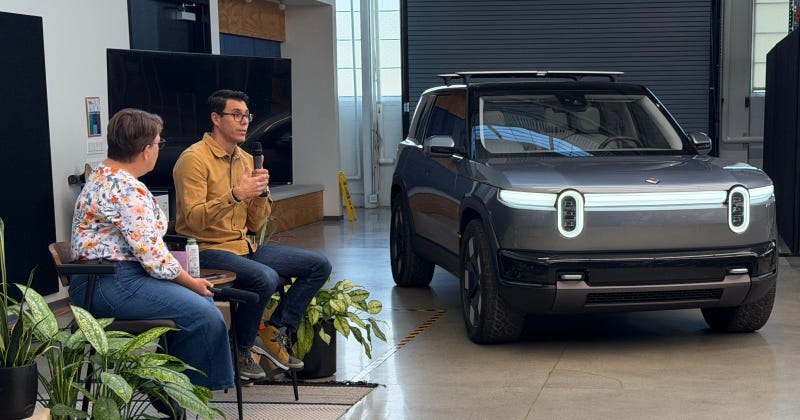
PLYMOUTH (WWJ) -- Rivian founder RJ Scaringe has no quarrel with the Trump administration’s tariffs, or its move to end tax credits for electric vehicles.
“As much as there’s been a perception of an anti EV technology,” Scaringe told the Automotive Press Association. “I think the current administration is very much pro business and pro technology, or pro American technology first.”
Rivian has seen strong sales of its R1T and R1S electric pickups and SUV’s, which are aimed at more affluent buyers. The smaller R2 will hit the market next year, with a price closer to 45 thousand dollars.
Scaringe calls those “compelling products” which will find buyers, even without incentives. He says EVs that are sold primarily on price could face a different future.
“That’s going to go away. I think you’re going to see far less irrational pricing behavior as a way to generate EV sales.”
The share of electric vehicles won’t rise above eight percent, Scaringe says, if only a few carmakers are making compelling EVs. It will take time, but Scaringe feels the market will see a variety of electric vehicles that will attract buyers, and they will come from a variety of carmakers.
“A number of them are still committed to electrified portfolios and are going to make highly competitive products.”
Many auto execs have expressed concerns about lower cost, higher technology electric vehicles from China.
“There’s nothing magic,” says Scaringe. “When you take a Chinese car apart, it’s not as if it’s built differently, or with technologies that are not being used in a Rivian or a Tesla or another U.S. manufactured vehicle.”
But Chinese vehicles have lower costs, he says, because of government subsidies which allow plants to be built for very low–and even no–cost, as well as lower cost labor. Scaringe says Chinese carmakers have an advantage in technology and software, but other carmakers are catching up.
For those reasons, he expects high US tariffs to minimize the number of Chinese built vehicles that come into the US. While there remains a lot of uncertainty around tariffs, Scaringe says there are things carmakers can plan on, which is why Rivian is expanding its plant in Illinois, and building a new factory in Georgia.
“There is going to be an increasing focus on domestic production.”
Scaringe spoke at Rivian’s facility in Plymouth, which used to be the company’s headquarters. While Rivian’s headquarters is now in California, they have about a thousand workers in Plymouth.
“But the idea of a headquarters is sort of, I don’t know what it means any more,” said Scaringe. “We’re so fluid in where we work and we can work across locations so easily. It’s not as if I go to the same office every day.”
